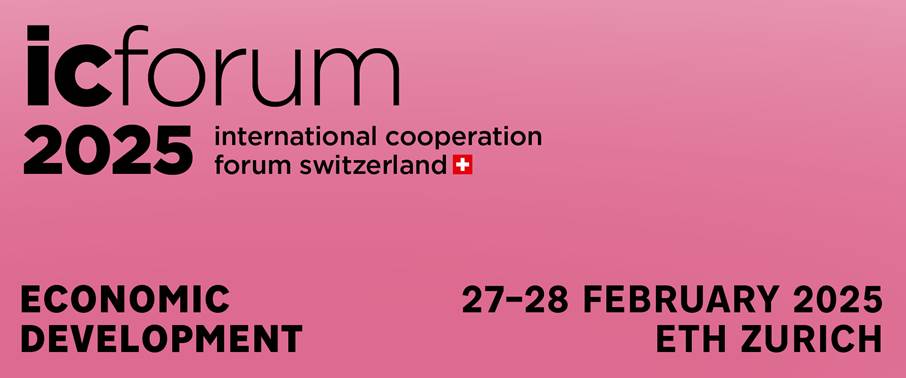
27 & 28 February 2025 | ETH Zürich.
This year, we have chosen to focus on the potential of economic growth and how Switzerland can help developing and partner countries to capitalise on that in a socially, environmentally and climate-friendly way.
Over the course of two days, actors from international cooperation, politics, business, research, philanthropy, NGOs and youth representatives will come together to engage in dialogue and share ideas for solutions that can bring about sustainable economic change. In addition to speeches by two representatives of the Federal Council, innovation and multilateralism will be addressed by ETH Zurich professor and astrophysicist Thomas Zurbuchen and the director-general of the International Trade Organization, Ngozi Okonjo-Iweala. The event is accompanied by the Swiss Federal Councillors Guy Parmelin and Ignazio Cassis.
During the various thematic sessions, we will also examine subjects such as sustainable finance and the role of the private sector, including the reconstruction of Ukraine. Other topics will include solutions for sustainable trade, the potential for economic development on the African continent to benefit local populations, and the role of democracy, science, and ’smart‘ cities.
We are counting on your presence to enrich the discussion with creative perspectives.
Contribution Chair Architecture and Urban Design, Prof. Hubert Klumpner
Session on Friday 28 February 2025 „Session 4: Swiss Solutions for Smart Cities“
How does the «Digital Twin» project showcase the effectiveness of Swiss innovations in complex urban development decision-making processes? This session will present innovative Swiss solutions for urban development, showcase an AI-based «Digital Twin» project by ETH Zurich and the City of Sarajevo, and explore the associated challenges and opportunities in science, technology, and policy.
Cities are vital for economic growth and innovation. As urban populations rise, they must implement smart strategies to realise their potential. By leveraging cutting-edge solutions, smart cities have the potential to improve the development and resilience of urbanisation processes significantly. However, critics argue that these technologies may favour corporate interests, increase surveillance, and deepen the digital divide.
Key Questions
Which smart solutions can cities implement to unlock their economic growth and innovation potential?
How does the «Digital Twin» project showcase the effectiveness of Swiss innovations in complex urban development decision-making processes?
What are the risks of smart solutions for cities in international cooperation?
This session will present innovative Swiss solutions for urban development, showcasing an AI-based «Digital Twin» project by ETH Zurich and the City of Sarajevo, and explore the associated challenges and opportunities in science, technology, and policy.
Speakers
- Hubert Klumpner, Professor ETH, Architecture and Urban Design
- Natasa Pelja Tabori, Deputy Director of the Sarajevo planning authority
- Anna Schindler, Director Urban Planning Department of Zurich City
- Ola Söderström, Professor University of Neuchatel, Urban Geography
Moderation
Caroline Huwiler, Managing Director Institute for Development, Environment and Energy IDE-E & Energie-Consulting ENCO
Exhibition
The exhibition stands in the Column Hall of the Main Building on both days of the Forum, showcasing the Urban Transformation Project Sarajevo and the city’s first digital urban twin. Visitors will also have the opportunity to interact with the digital twin and simulate new urban planning scenarios.
Organisation
To register, please click on this link.
More information and the detailed programme are available on the event website.
Contact: Dr. Michael Walczak, Chair Architecture and Urban Design, Prof. Hubert Klumpner